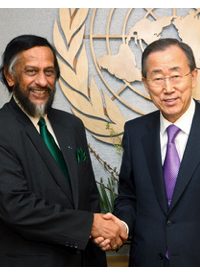
The United Nations is launching an independent review of its climate agency, the Intergovernmental Panel on Climate Change (IPCC), which has weathered harsh criticism due to numerous problems with its 2007 comprehensive climate report. UN Secretary-General Ban Ki-moon and IPCC Chair Dr. Rajendra Pachauri announced the review at a press conference at UN Headquarters in New York.
IPCC errors have made recent headlines in a series of “-gate” scandals – Climategate, Glaciergate, Chinagate — and other gaffes in the 2007 Fourth Assessment Report (AR4). Each blunder involves intentional (or, at best, willfully negligent) manipulation and reporting of climate-change data to give the impression that anthropogenic (man-made) global warming (AGW) is destroying the planet.
An independent organization of science academies, the InterAcademy Council (IAC), will conduct the review, examining IPCC management procedures as well as the processes it uses to compile reports. An IAC press release explained that it will recommend necessary revisions as well as “measures and actions to strengthen the IPCC’s capacity to respond to future challenges and ensure the ongoing quality of its reports.” Such a statement is nothing less than a shameless admission of foregone and forthcoming IPCC approval.
Indeed, the IAC can hardly be considered an objective body, as it currently serves in an advisory capacity to the UN. Among the partner organizations listed on its website are the United Nations, the UN Educational, Scientific and Cultural Organization (UNESCO), the UN Development Program (UNDP), and the United Nations Environmental Program (UNEP).
The site also declares IAC’s commitment to answering “the crucial challenge of achieving sustainability,” without any reference to inclusion of valid scientific research from climate-change skeptics, such as nearly 200 scientists who have called on the UN to provide valid evidence of AGW. In their December 8, 2009 “Climate Challenge” open letter to Ban Ki-moon, they unequivocally state that climate science is not settled. “It is those who propose that [AGW] is happening, and promote the allocation of massive investments to solve the supposed ‘problem,’ who have the obligation to convincingly demonstrate that recent climate change is not of mostly natural origin and, if we do nothing, catastrophic change will ensue. To date, this they have utterly failed to do.” Ki-moon has not responded to these scientists’ request.
Instead, at Wednesday’s press conference, the Secretary-General all but admitted that the probe is merely an IPCC whitewash when he downplayed the importance of what he called “a very small number of errors” in the 2007 Fourth Assessment Report (AR4). “Remember, this is a 3,000 page synthesis of complex scientific data,” said Ki-moon. “I have seen no credible evidence that challenges the main conclusions of that report. The scientific basis for climate action remains as strong as ever. Indeed, evidence collected since the 2007 report suggests climate change is accelerating. The need for action is all the more urgent.”
Pachauri underscored the hypocrisy by stating, “I am very grateful to the Secretary General’s unwavering support, not only in jointly requesting the IAC to undertake this review, but for his steadfast support of the IPCC and climate change science.”
IPCC says that it plans to use IAC’s recommendations as it prepares its Fifth Assessment Report (AR5), due for publication by 2014. The author nomination period for AR5 ends on March 12. IAC will present its findings by August 31, 2010.
Photo of Rajendra Pachauri and Ban Ki-moon: AP Images




